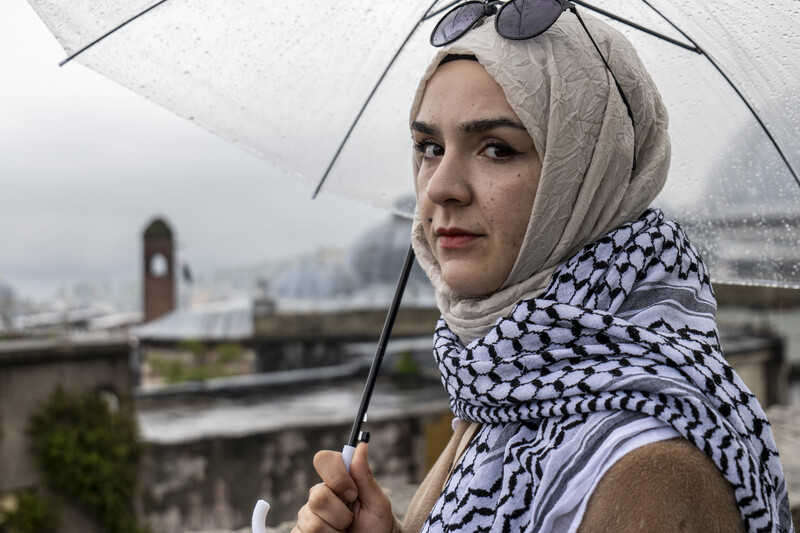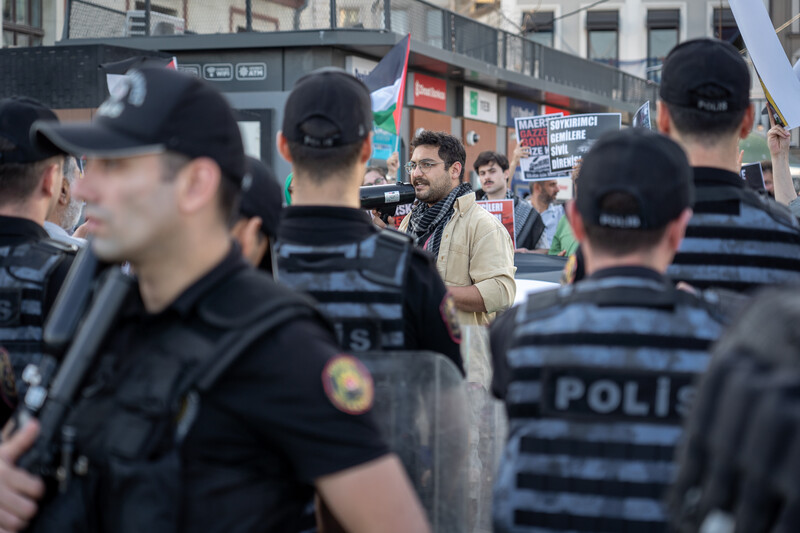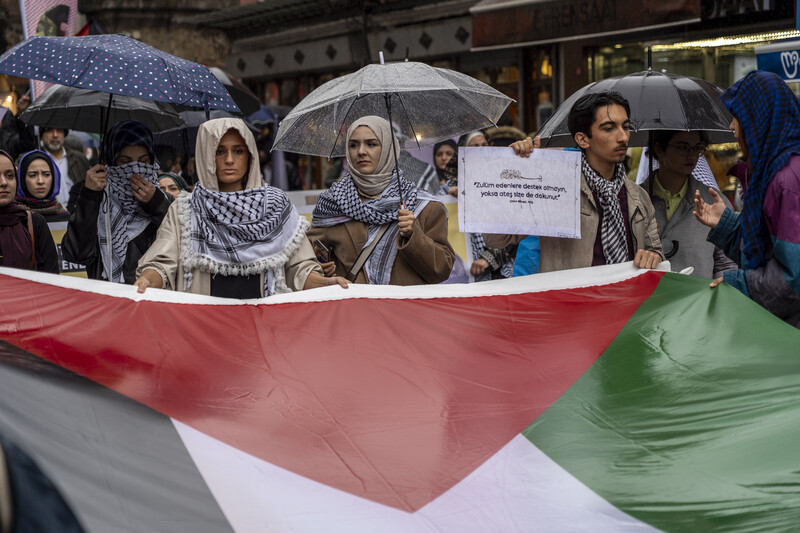The Electronic Intifada 6 October 2025
The judge and prosecutor murmur about court procedure while lawyers occasionally object. The indictment accuses the defendants of transgressions including shouting “Free Palestine!” and “From the river to the sea, Palestine will be free!”
But this is not Germany, Britain or the United States, where repression of supporters of Palestinian rights has become commonplace.
It is Turkey – among the loudest countries decrying the genocide in Gaza and whose president claims to be “the voice” of Palestinians.
Even here, not everyone is permitted to say “Free Palestine!” wherever they wish.
The hearings were held in May and September, with the next one scheduled for February next year. Şeyma Yıldırım and the other eight defendants are facing charges of six months to three years in prison.
“They know they’ll have to acquit us,” asserted Yıldırım, one of the defendants, as she left the courtroom in the May hearing.
“There is nothing to prove. We all admit to doing what they are accusing us of doing,” she said. “What’s the crime here? They just keep delaying the court hearing. This is our ninth day in court – that’s how they punish us.”
Turkey’s initial response to the events of 7 October 2023 and Israel’s barbaric assault on Gaza was surprisingly moderate. Eyeing a mediator’s role between Hamas and Israel, President Recep Tayyip Erdoğan restrained his usually harsh rhetoric. Only once that role was filled by Qatar and Egypt did Ankara toughen its speech.
By early 2024, Erdoğan and his ruling Justice and Development Party (AKP) were facing strong domestic criticism for Turkey’s continued trade with Israel. By May that year, the Turkish government announced a complete halt to all imports and exports.
However, some trade continues to this day.

Şeyma Yıldırım is convinced her government is not doing enough for the Palestinians.
Growing up, Yıldırım was not directly engaged with politics or activism. But after 7 October 2023, she started attending protests.
“I soon realized that only going to protests is not going to be enough,” she told The Electronic Intifada.
“We were just chanting slogans. After so many peaceful protests, I realized that we need to do something that could change the situation in Palestine.”
Instead of attending the large pro-Palestine marches organized by the government, Yıldırım joined more radical protests characterized by criticism of government policies.
The most prominent organizer of such protests has been 1000 Youth for Palestine, an activist group inspired by Palestine Action in the UK.
Their demands include shutting down the Israeli embassy and expelling US and NATO forces from Turkey. Slogans such as “Murderer Israel, collaborator AKP” have been common.
Their diverse activists include communist students and conservative, anti-capitalist Islamists who oppose the government. During protests outside businesses or ports, Turkish riot police have frequently arrested demonstrators or dispersed them with pepper spray.
These protests caused obvious discomfort to the government. Defending the rights of Muslims – at home and abroad – has been an AKP rallying cry throughout its almost quarter-century rule. Images of young women in headscarves, wearing kuffiyehs and waving the Palestinian flag, being handcuffed and manhandled by police were particularly damning.
Oil to Israel passes through Turkey
Azerbaijan, on the Black Sea, is both a close ally of Turkey and Israel.
Around 30 percent of Israel’s oil comes from Azerbaijan’s state oil company SOCAR, via the Baku-Tbilisi-Ceyhan pipeline (BTC) that runs straight through Turkey – making it one of the genocidal state’s main suppliers.
Ankara claims that international agreements do not allow Turkey to interfere with the flow of oil through this pipeline or dictate where it ends up – otherwise, Turkey could be liable for substantial monetary compensation.
However, as a signatory to the 1948 Genocide Convention, Turkey’s international obligation to prevent and punish the crime of genocide may arguably supersede any such contractual obligations.
At any rate, critics remain unconvinced by Ankara’s rationale for the ongoing oil trade with Israel.
In May 2024, Yıldırım joined a 1000 Youth for Palestine protest in front of SOCAR’s Istanbul office.

A demontration by the activist group 1000 Youth for Palestine is surrounded by Turkish riot police, in Istanbul, Turkey on 9 June 2025.
“We realized that this company is complicit in this genocide,” she says.
The protest escalated, according to Yıldırım – doors were broken and activists who daubed the building with paint later proudly showed off their red-stained kuffiyehs.
Yıldırım also claims she saw gift packages with the SOCAR logo among the possessions of riot police protecting the company’s offices. The following day, on 1 June 2024, police raided Yıldırım’s house, and she was detained for the first time.
Opposition
Many opposition politicians also criticize the sale of Azerbaijani oil to Israel through Turkey.
Suat Kılıç was once a close ally of Erdoğan and even a minister in the president’s government. He has since resigned and joined the Islamist New Welfare Party (YRP) in opposition.
YRP’s harsh criticism of government policies on Palestine arguably contributed to its victory in several AKP strongholds during local elections in 2024.
“If Israeli jets are flying thanks to Azerbaijani oil that is sold through Turkey, that means we are all complicit in this crime,” Kılıç told The Electronic Intifada at his office in Ankara.
He also asserts that other goods, including iron and cement, are still exported to Israel from Turkey – but disguised as sales to the Palestinian Authority – though Turkey has implemented some measures it claims will narrow that loophole.
“On paper, the goods go to Palestine, but you see that when they arrive in Israel, the final destination is the Israeli occupiers,” according to Kılıç.
He asserts that his party would immediately stop all exports to Israel and close down NATO bases in the country if they were in government. But as of now the party only garners around 4 to 7 percent of the vote.
The main opposition Republican People’s Party (CHP), which received more votes than the ruling AKP in the last local elections, has also tried to pose as more pro-Palestinian than the government.
In April, CHP organized a protest for Palestine in Istanbul. The march was blocked by police, an action the party had anticipated, as no opposition group has been allowed to protest in the city center for years – for any cause.

Şeyma Yıldırım attempts a demonstration in solidarity with Palestinians in Gaza on 17 May 2025 in Istanbul, Turkey.
Many critics view the CHP’s rhetoric on Palestine as insincere domestic politics. To make matters worse, Istanbul mayor Ekrem İmamoğlu, the party’s rising star and presidential candidate, called Hamas a terrorist organization.
It did not go down well with the public. Erdoğan, on the other hand, likens Hamas to the Turkish independence fighters who defended the country from foreign occupation in the 1920s.
“We made a lot of effort on this topic. We try to bring the Palestinian issue to the agenda everywhere we go,” İlhan Uzgel, CHP’s foreign affairs spokesperson, told The Electronic Intifada. However, he declined to offer specifics or address criticisms his party faces.
Not deterred
Being arrested has not deterred Yıldırım.
Soon after her release in June 2024, she participated in another protest during a speech by Erdoğan.
While the president was addressing the crowd, Yıldırım stood up and shouted: “Mr. President, why does Azerbaijani oil go through our country?” She was immediately grabbed and dragged out by security.
After a few days at the police station, Yıldırım was formally charged and sent to prison.
She was released after a week, pending trial for “insulting the president” and “unlawful” protest. There are currently four court cases against her, and she is banned from leaving the country.
“There is a kind of hypocrisy that is going on right now,” Yıldırım says.
“Pro-Palestine people in Turkey do not realize that our country is complicit in this genocide. Turkey is earning $1.27 on each barrel when they sell oil to Israel through our BTC pipeline,” she asserts.
While this exact figure has been widely reported, it cannot be independently verified.
What is not in doubt is that Turkey, whose national oil company TPAO also owns a stake in the BTC pipeline, earns substantial revenue.
“It looks like Turkey cares more about money than Palestinian people’s lives. They are using this oil for military vehicles, for jets, they are using it to kill Palestinian people,” Yıldırım adds.
“Whether this is the case or not, it has to be researched,” İsmail Emrah Karayel, a lawmaker for the ruling AKP, told The Electronic Intifada. He is the head of the Turkey-EU Joint Parliamentary Committee, where he regularly raises the issue of the ongoing war in Palestine.
“We have to look at the larger picture,” Karayel argues.
“How many states stopped trade with Israel? How many states cut off diplomatic relations with Israel? How many countries joined South Africa’s case against Israel for genocide in the International Court of Justice (ICJ) despite all the Zionist lobby?” he asks.
“Of these countries, how many have a leader who makes statements with the clarity of our president? And the statements are followed by actions.”
Fear of repercussions
On 29 August, Hakan Fidan, Turkey’s foreign minister, told parliament that all trade had been cut off with Israel and that Ankara had closed its airspace to Israeli aircraft.
“There is no other country that has completely cut off trade relations with Israel,” the minister added. There was no mention of the BTC pipeline.
And while the announcement about overflights grabbed headlines, Turkish authorities quickly clarified that the country was closing its airspace only to official Israeli flights and flights carrying weapons or ammunition, but not to commercial traffic.
The new restrictions moreover do not appear to ban third country vessels from transferring oil from Turkey to Israel.
“The only voice for the Palestinian people is the Palestinian people themselves,” Leila, a Palestinian student and activist in Turkey, told The Electronic Intifada, in response to Erdoğan’s claim to be the voice of her people.
Leila asked that her real name not be used, fearing repercussions from Turkish authorities.
“I am actually afraid of being deported. But at the same time, this fear is not preventing me from speaking up,” Leila added.
“This support of the Turkish people and government should go beyond symbolic slogans,” Leila adds, urging action “like boycotting, stopping the trade and stopping the military support for the Zionists.”
Two years into the genocide, it is clear that for many people, Turkey could still be doing much more to stop the genocide.
Daniel Thorpe is an Istanbul-based journalist covering politics and economics in Turkey and Eastern Europe. Alparslan Aydın is a video journalist in Turkey working for Agence France-Presse.
All images in the article are by Daniel Thorpe and Alparslan Aydın.


